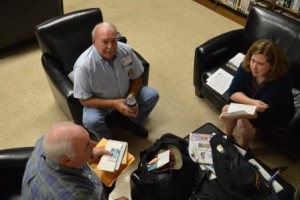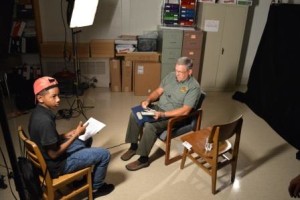Inspiration
I think every teacher has that one instructional unit each year that they struggle with, and for me, Vietnam was the US History unit that always left me feeling dissatisfied. Even though my grandfather served in both the Korean and Vietnam wars and my father was a Vietnam veteran, I never really asked them any questions about their service. As a history teacher I felt that missed opportunity acutely when my grandfather died last winter.
Brainstorm
A few weeks after Grandpa’s funeral, I saw the upcoming Vietnam unit in my US History curriculum. I was determined to do things differently this time. Anne Arundel County high schools have signature programs that focus instruction on a specific set of ideals, and I brainstormed ideas with our Southern High School program facilitator to determine how I might unite the Vietnam unit with our signature theme, Design: Preservation & Innovation. I decided I wanted my students to design and film personal interview questions with recruited Vietnam veterans in order to preserve this important historical event.
Getting Started
I knew from my time in graduate school that there was an oral history center at the University of Maryland, Baltimore County. Although I had an idea of what oral history was, I had a lot to learn about the process if I was going to teach it to my students. I contacted Dr. Barry Lanman, Director of UMBC’s Martha Ross Center for Oral History, to assist me with my project. He connected me with the Maryland Humanities Council, which wanted to launch an oral history project with high school students and veterans, and before I knew it, my oral history lessons had begun.
Rallying Support
I spent the next couple of months rallying support for the project. My department chair added two US History courses to my teaching schedule to assure quantitative student participation. My principal gave me full support with the response, “Just tell me what you need and if I can’t provide it, I will find someone who can.” My central office Social Studies Coordinator provided funding for substitutes to cover my classes on interview days. The Signature Program Facilitator and I collaborated to make the project even more real-world applicable, by enlisting the volunteer services of a professional cameraman who taught students how to set up an interview “studio” and operate the camera. Many hours were spent contacting parents and community members to make connections with local veterans who would be willing to share their stories. Patriotic business cards became my touchpoint to contact veterans I met at the grocery store, library, or any venue possible. The unimaginable support I received from the school system, the community, and my project partners was overwhelming.
The Veterans

The men and one woman interviewed by the students shared their stories with open hearts, and we heard accounts that moved us to tears and that made us laugh out loud (much to the chagrin of the cameraman). Many veterans told us stories that they had never shared with their families. Here are some of their comments following the interviews:
It was an interesting thing to do. The process of digging through photos, souvenirs, copies of old orders, and other memorabilia was meaningful after 43 years. I WAS impressed with all of the students I met.
The enthusiasm, and preparedness of your students was impressive. I have spoken about them at different forums, as the leaders of a new generation of Americans, who will study the past, so, not to repeat the mistakes.
Talking with students also helps those of us who have said little about our combat experiences because, in a sense, we feel guilty about why others died and not us/me? So, to be able to talk about it helps the veterans. The opportunity you provided to both students and veterans is wonderful and I do hope that our messages are meaningful to students.
Again it was a wonderful experience with your students and a great project for them. To see and talk to real Vietnam vets is important to get real stories. You have a lot of work to do but it is a really worthwhile experience for the students “as well” as us Vietnam vets.

The Students
The response of my students to “doing history” instead of studying history was heartening. They worked hard on their questions and they looked forward to Dr. Lanman’s visits to teach them about the art of oral history. Dr. Lanman emphasized that this was an “experience,” not just another school project. I think that before the interviews this point did not resonate with all of them, but following the interviews there were quite a few students who were changed because of the experience:
It was an amazing experience to meet and talk to a veteran.
I feel more connected to history.
I feel very proud and happy that I did this, it motivates me to learn more about history. My opinion of history has changed. It made me more motivated to learn about history and it seems much more interesting now.
This oral history experience was amazing. I learned so much and will never forget this. I LOVED IT, I was super skeptical at first. I felt like we had a lack of planning but I think everything went so great.
It was very interesting and I’m excited to put this in my resume.
Lessons Learned
I couldn’t be more proud of the material that my students produced. In Anne Arundel County, students take US History in 9th grade and at the age of 14, my students produced oral history videos that are insightful and thought provoking. They learned many lessons about honor, respect, and dealing with sensitive issues. As a teacher, I am so pleased to have created a meaningful lesson on the Vietnam War for my students, and I feel that profound peace that comes with a job well done.
Happy Veteran’s Day to all of the Veterans who have bravely served in our country’s Armed Forces. And rest in peace, Grandpa, your bravery and sacrifice are not forgotten.
Under the guidance of their teacher, Jennifer Davidson, and oral historian, Dr. Barry Lanman of UMBC, students at Southern High School are participating in a year-long oral history project in which they interview local Vietnam veterans and then create 5 to 7 minute segments that will become part of the collection of the Maryland State Archives and showcased at a final event in May 2016.

